Publications
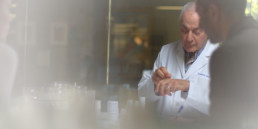
“The road to success runs through managing change.”
Over the years, Dr. Murad has written scores of papers for research journals and trade publications in order to spread his findings about skincare, aging, stress, and Modern Wellness. His results have been published in HSOA Journal of Gerontology & Geriatric Medicine, the Journal of Aging Science, the British Journal of Dermatology, International Journal of Women’s Dermatology, and many more. We include a few of his most recent articles here.
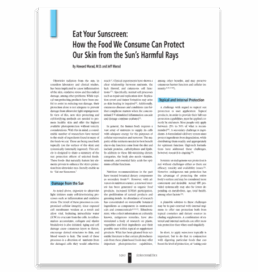
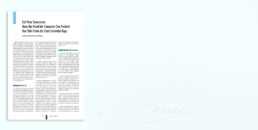
Eat Your Sunscreen:How the Food We Consume Can Protect Our Skin from the Sun’s Harmful Rays
Ultraviolet radiation from the sun, in countless laboratory and clinical studies, has been implicated to cause inflammation of the skin, oxidative stress and free-radical damage, among other problems. While topical sun-protecting products have been useful to assist in reducing sun damage, their protection alone is not adequate to prevent damage from ultraviolet light impingement. In view of this, new skin protecting and cell-fortifying methods are needed to promote healthy skin and offer the highest available photoprotection without toxicity considerations. With this in mind, a considerable number of researchers have turned to the study of ingredients found in many of the foods we eat. These are being used both topically (on the surface of the skin) and systemically (internally ingested). This article is designed to share a summary of the sun protection effects of selected foods. These foods- that naturally feature key elements proven to enhance the skin’s protection from ultraviolet rays- literally enable us to “Eat our Sunscreen.”
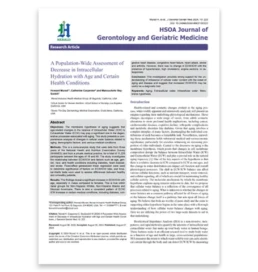
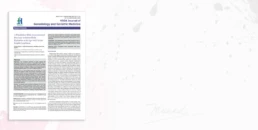
A Population-Wide Assessment of Decrease in Intracellular Hydration with Age and Certain Health Conditions
The membrane hypothesis of aging suggests that age-related changes in the balance of Intracellular Water (ICW) to Extracellular Water (ECW) may play a significant role in the degen erative processes associated with aging. This study presents a com prehensive analysis of changes in cellular water balance related to aging, demographic factors, and various medical conditions. Methods: This is a meta-analysis study that uses data from three years of the National Health and Nutrition Examination Survey (NHANES) and from a private medical practice, for a total of 11,228 participants between the ages of 18 and 90. The study investigates the relationship between ECW/ICW and factors such as age, gen der, race, and health conditions including diabetes, heart disease, and stroke. Fixed-effect generalized linear regression were used to determine significance of factors on ECW/ICW ratio, and Krus kal-Wallis tests were used to assess differences between healthy and unhealthy patients. Results: The findings reveal a significant increase in ECW/ICW with age, especially in males compared to females. This is true within racial groups for Non-Hispanic Whites, Non-Hispanic Blacks and Mexican Americans. There is also a consistent pattern of ECW/ ICW increase in certain medical conditions, including diabetes, congestive heart disease, congestive heart failure, heart attack, stroke and arthritis. However, there was no change in ECW/ICW with the presence of hypertension, high cholesterol, angina pectoris, or os teoporosis. Conclusion: This investigation provides strong support for the un derstanding of imbalance of cellular water content with the onset of aging and disease and suggest that increased ECW/ICW may be useful as a diagnostic tool.
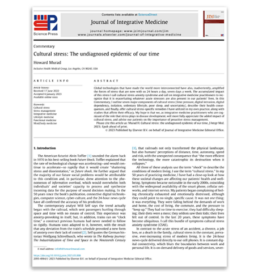
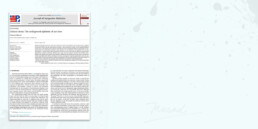
Cultural stress: The undiagnosed epidemic of our time
Global technologies that have made the world more interconnected have also, inadvertently, amplified the forces of stress that are now with us 24 hours a day, seven days a week. The accumulated impact of this stress I call cultural stress anxiety syndrome and call on integrative medicine practitioners to recognize that it is exacerbating whatever acute stressors are also present in our patients’ lives. In this Commentary, I outline seven major components of cultural stress (time pressure, digital intrusion, digital dependency, isolation, sedentary lifestyle, poor sleep, and uncertainty), describe their health consequences, and finally, offer cultural stress-specific remedies I have utilized in my own practice, along with studies that affirm their efficacy. My hope is that we, as integrative medicine practitioners who are cognizant of the role that stress plays in disease development, will more fully appreciate the added impact of cultural stress, and advise our patients on the importance of proactive stress management.
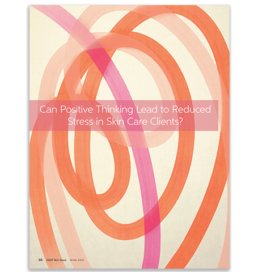
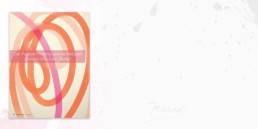
Can Positive Thinking Lead to Reduced Stress in Skin Care Clients?
New research suggests a simple, noninvasive, and novel intervention—the use of positive Insight Cards—may help reduce stress, which has been linked to myriad health problems and been identified as a risk factor for the development of aging-related diseases, as well as a possible contributor to skin aging and acne.1 Dermatology patients showed a significant reduction in reported stress levels after using the Insight Cards, suggesting the cards could complement other stress-busting spa services.
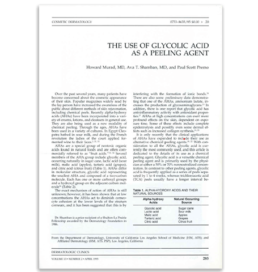
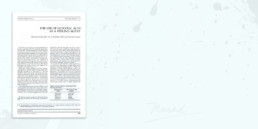
The Use of Glycolic Acid as a Peeling Agent
Over the past several years, many patients have become concerned about the cosmetic appearance of their skin. Popular magazines widely read by the lay person have increased the awareness of the public about different methods of skin rejuvenation, including chemical peels. Recently alpha-hydroxy acids (AHAs) have been incorporated into a variety of creams, lotions, and cleansers in general use. They are also being used as a new modality of chemical peeling. Through the ages, AHAs have been used in a variety of cultures. In Egypt Cleopatra bathed in sour milk, and during the French revolution the ladies of the court applied fermented wine to their faces.
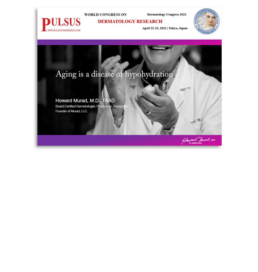
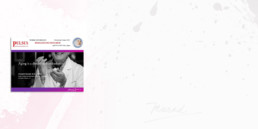
Aging is a disease of hypohydration
There are over 300 different theories of aging.
Most prominent and well-studied is the free radical theory of aging.
However, in 1978, Hungarian researcher, Dr. Imre Zs-Nagy, proposed the Membrane Hypothesis of Aging (MHA) and in 2002 explained how it improves upon the free-radical and other theories.
My own clinical experience and research confirm Zs-Nagy’s hypothesis: that aging is fundamentally a disease of hypohydration–water leaking out of the cells, inhibiting their function.
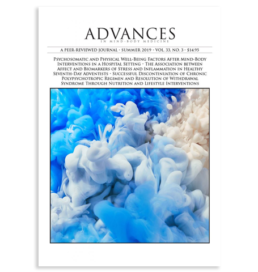
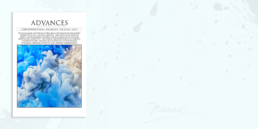
Cultural Stress: The Ubiquitous Stressor Hiding in Plain Sight
“Cultural Stress” is the constant, pervasive, ever-increasing stress of modern living. It includes over-exposure to technology at the expense of in-person relationships; 24-hour connectivity, which blurs the boundaries between work and personal life; on-demand delivery of goods and services, which severs neighborhood and community relationships and results in long sedentary hours in front of our screens; the pace of technological change, which contributes to professional, economic, and social insecurity; our global economic system, which sows uncertainty as it outsources jobs overseas or to new technologies; environmental contaminants, noise, crowding, and various new sources of radiation; changes to our diet, which has become heavily reliant on a few processed commodities (corn, wheat, sugar, and soy); and changes to our urban development and transportation patterns, which result in less physical activity and more hours spent sitting in long commutes.
It is the chronic nature of Cultural Stress that distinguishes it from conventional stress. Because Cultural Stress is ubiquitous, the body seldom gets a chance to recover without active intervention strategies.
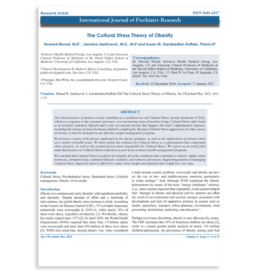
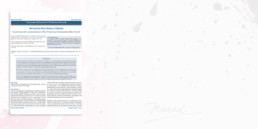
The Cultural Stress Theory of Obesity
The characteristics of modern society contribute to a condition we call Cultural Stress Anxiety Syndrome (CSAS), which is a response to the constant, pervasive, ever-increasing stress of modern living. Cultural Stress often leads to an isolated, sedentary lifestyle and a state of constant anxiety that triggers the body’s inflammation response, including the release of stress hormones linked to weight gain. Because Cultural Stress aggravates all other causes of obesity, it must be included in any effective weight management program.
We present a review of the factors implicated in the obesity epidemic, as well as the implications of chronic stress on a variety of health issues. We then outline the evidence for Cultural Stress as a phenomenon that compounds other stressors, as well as the societal factors most responsible for Cultural Stress. We report on an initial pilot study that focuses on Cultural Stress-reduction as part of an inclusive health management program.
We conclude that Cultural Stress is a factor in virtually all of the conditions that contribute to obesity: higher stress hormones, disrupted sleep, sedentary lifestyle, isolation, and reduced self-esteem. Supporting patients in managing Cultural Stress empowers them to effectively reduce their weight and maintain that weight loss over time.
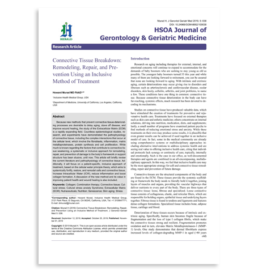
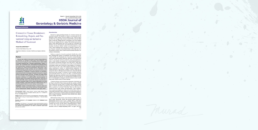
Connective Tissue Breakdown: Remodeling, Repair, and Prevention Using an Inclusive Method of Treatment
Research on aging, including therapies for external, internal, and emotional concerns, will continue to expand to accommodate for the demands of baby boomers who are seeking to stay young as old as possible. The youngest baby boomers turned 55 this year and, while many of them are looking forward to retirement, you can be assured that none are looking forward to aging. With intrinsic and extrinsic aging, certain deteriorations may occur, giving rise to disorders and illnesses such as arteriosclerosis and cardiovascular disease, ocular disorders, skin laxity, cellulite, arthritis, and joint problems, to name a few. These conditions have one thing in common: connective tissue. Because connective tissue deterioration in the body can have far-reaching, systemic effects, much research has been devoted to decoding its mechanisms.
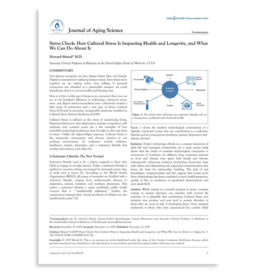
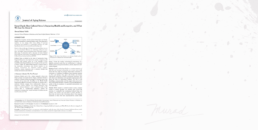
Stress Check: How Cultural Stress Is Impacting Health and Longevity, and What We Can Do About It
Our phones recognize our face shapes better than our friends. Digital consumption is replacing human touch. Even when we’re together, we are texting rather than talking. lf personal connection was classified as a sustainable resource, we could hypothesize that it is non-renewable and fleeting fast.
How is it that, in this age of being more connected than ever, we are at our loneliest? Advances in technology, enhanced screen time, and digital interconnectedness have collectively created a false sense of connection and a new type of stress: Cultural Stress (CS) and its pervasive, recogn izable syndrome classified as Cultural Stress Anxiety Syndrome (CSAS).
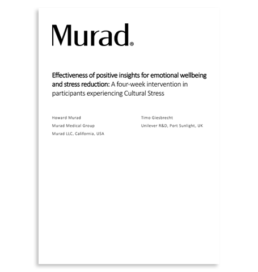
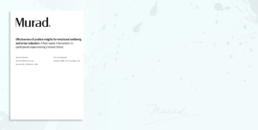
Effectiveness of positive insights for emotional wellbeing and stress reduction: A four-week intervention in participants experiencing Cultural Stress
Stress has been highlighted as a key risk factor in modern societies for the pathogenesis of aging related diseases (Gassen et al., 2017). For example, perceived stress (e.g. Parks et al., 2009; Puterman et al., 2010) and work-related stress (Ahola et al., 2012) are frequently associated with accelerated cellular aging. Moreover chronic, excessive and/or persistent stress, i.e. the cumulative load of day-to-day stresses are often cited as independent risk factors for a wide range of serious health problems including cardiovalscular disease, stroke, depression, and autoimmune disorders (McEwen et al., 1998). Furthermore, longitudinal assessments of over 3000 adults have observed that chronic stress over a period of several years can have enduring negative impact on health outcomes 3-7 years later (Steptoe et al., 2005). Thus, stress is readily identifiable as an important risk factor for aging-related diseases (Gassen et al., 2017).
Positive emotions and stress-reduction have profound effects on overall wellbeing and physical health. Based on scientific findings from positive psychology, we have developed 11 positive insight cards that we expect to reduce stress and enhance wellbeing.
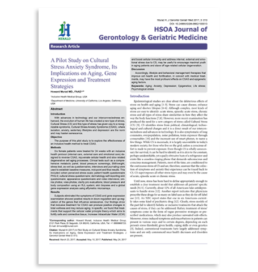
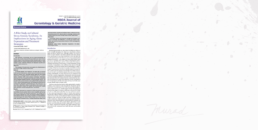
A Pilot Study on Cultural Stress Anxiety Syndrome, Its Implications on Aging, Gene Expression and Treatment Strategies
Epidemiological studies are clear about the deleterious effects of stress on health and aging [1-3]. Stress can cause disease, enhance aging and shorten lifespan [4-6]. Although complex, most kinds of stress are easy to identify: acute stress, episodic acute stress, chronic stress and all types of stress share similarities in how they affect the way the body functions [7,8]. However, more recent examination has produced the need for a new category of stress called Cultural Stress (CS) [9]. CS identifies stress from political, climatological, technological and cultural changes and it is a direct result of our interconnectedness and advances in technology. It is also symptomatic of long commutes, overpopulation, noise pollution, toxin exposure through consumables [10] and the incessant use of smart phones, to name a few things. While CS is manmade, it is largely unavoidable in today’s modern society, for those who live on the grid, unless a conscious effort is made to prevent exposure. Even though CS is wholly unnecessary for survival, it can be hard to identify as it is akin to the constant, perhaps unidentifiable, yet equally obtrusive hum of a refrigerator and exists like a ceaseless ringing phone that demands subconscious and conscious management. Patients, most of the time, are conditioned to the continuous stress of CS and are, therefore, unaware that the collection of symptoms and anxiety they experience can be traced back to CS. CS superimposes all other stress types.
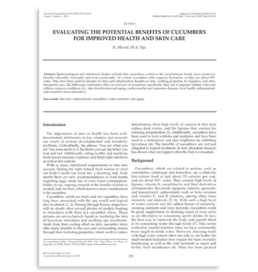

Evaluating the Potential Benefits of Cucumbers for Improved Health and Skincare
The importance of diet on health has been welldocumented; deficiencies in key vitamins and minerals can result in serious developmental and metabolic problems. Undoubtedly, the phrase “you are what you eat” has some merit to it: the better you eat, the better you look and feel. Additionally, eating healthy and nutritious foods boosts immune responses and helps fight infections as well as free radicals.
With so many nutritional requirements to take into account, finding the right natural food sources to meet our body’s needs can seem like a daunting task. Each month there are new recommendations or food trends regarding eggs, meat, fat, or even water consumption. Suffice to say, ongoing research of the benefits of foods is needed, and one fruit, which deserves more consideration is the cucumber.

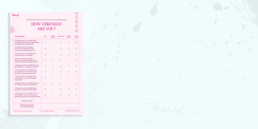
Modified Cohen Perceived Stress Questionnaire
The Modified Cohen Perceived Stress Questionnaire is a simple instrument we use to measure the degree of stress our patients are experiencing. We then introduce them to our 11 Insight cards, encouraging them to consider the cards twice daily and journal about them once a day. At the end of the month, when patients complete the Perceived Stress Questionnaire again, they are often amazed at how much their stress has gone down. This is the power of focusing attention inside the self, rather than outside, as our constant media onslaught encourages us to do.
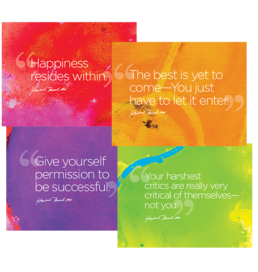
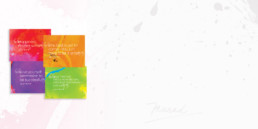
Insight Cards
Here are the 11 Insight cards we share with patients to help them reduce their Cultural Stress. Feel free to download and use them yourself!
Modern Wellness Digest
Sign-up to receive periodic updates and wellness insights from Dr. Murad himself.